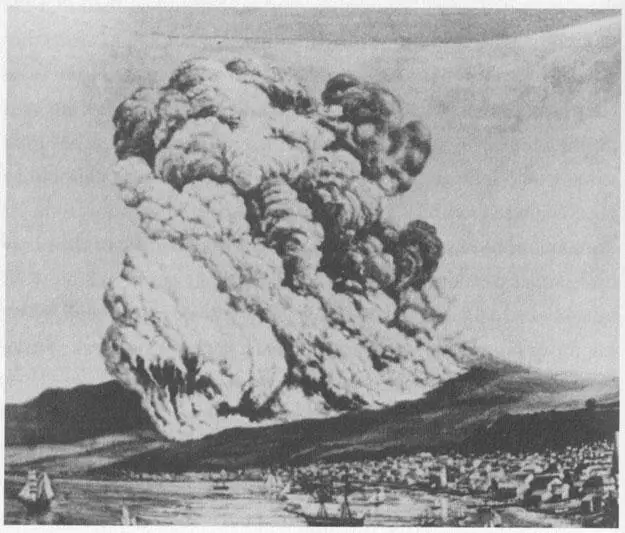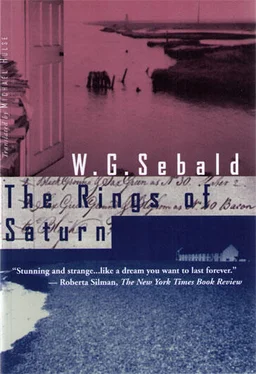In early April 1865, eighteen months after the departure from nowofastów, Evelina Korzeniowska died in exile aged thirty-two of the shadows that her tuberculosis had spread through her body, and of the home-sickness that was corroding her soul. Apollo's will to live was also almost extinguished. He was quite unable now to devote himself to his troubled son's education, and hardly ever pursued his own work at all. The most he could do was to alter the odd line or two in his translation of Victor Hugo's Les travailleurs de la mer. That prodigiously boring book seemed to him to mirror his own life. C'est un livre sur des destinées dépaysées, he once said to Konrad, sur des individus expulsés et perdus, sur les éliminés du sort, un livre sur ceux qui song seuls et évités. In 1867, a few days before Christmas, Apollo Korzeniowski was released from his Russian exile. The authorities had decided that he no longer constituted a threat, and gave him a passport valid for one journey to Madeira, for purposes of convalescence. But neither Apollo's financial position nor his frail state of health allowed him to travel. After a short stay in Lemberg, which he found too Austrian for his liking, he rented a few rooms in Poselska Street in Cracow. There he spent most of the time in his armchair, grieving for his lost wife, for the wasted years, and for his poor and lonely boy, who had just written a patriotic play entitled The Eyes of Johan Sobieski . Apollo had burnt all of his own manuscripts in the fireplace. At times, when he did so, a weightless flake of soot ash like a scrap of black silk would drift through the room, borne up on the air, before sinking to the floor somewhere or dissolving into the dark. For Apollo, as for Evelina, the end came in the spring, as it was beginning to thaw, but it was not granted to him to depart this life on the anniversary of her death. He lay in his bed till well into May, becoming steadily weaker and thinner. During those weeks when his father was dying, Konrad would sit at a little table lit by a green lamp in a windowless cabinet to do his homework in the late afternoon after school. The ink stains in his exercise book and on his hands came from the fear in his heart. Whenever the door of the next room opened he could hear his father's shallow breathing. Two nuns with snow-white wimples were tending the patient. Without a sound they glided hither and thither, performing their duties and occasionally casting a concerned glance at the child who would soon be orphaned, bent over his writing, adding up numbers or reading, hour after hour, voluminous Polish and French adventure stories, novels and travel books.
The funeral of the patriot Apollo Korzeniowski was a great demonstration, conducted in silence. Along the streets, which were closed to traffic, bare-headed workmen, schoolchildren, university students and citizens, who had doffed their top hats, stood in solemn emotion, and at every open upper-storey window there were clusters of people dressed in black. The cortège, led by eleven-year old Konrad as chief mourner, moved out of the narrow side street, through the centre of the town, past the Church of Mary the Virgin with its two unequal towers, towards Florian's Gate. It was a fine afternoon. The blue sky compassed the rooftops and on high the clouds scudded before the wind like a squadron of sailboats. During the funeral, as the priest in his heavy silver-embroidered vestments was intoning the ritual words for the dead man in the pit, Konrad perhaps raised his eyes and beheld the clouds drifting by, seeing them as he had never done before, and perhaps it was then that the thought occurred to him of becoming a sea captain, an altogether unheard-of notion for the son of a Polish gentleman. Three years later he expressed this wish to his guardian for the first time, and nothing on earth could put it out of his mind thereafter, not even when Uncle Tadeusz sent him to Switzerland for a summer holiday of several weeks with his private tutor, Pulman. The tutor was under instructions to remind his charge at every opportunity of the many careers that were open to him beside seafaring, but no matter what he said (at the Rhine falls near Schaffhausen, in Hospenthal, viewing the St Gotthard tunnel under construction, or up on the Furka Pass), Konrad stuck tenaciously to his resolve. Scarcely a year later, on the 14th of October 1874, when he was not yet seventeen, he took leave of his grandmother Teofila Bobrowska and his good Uncle Tadeusz, as they stood on the platform at Cracow outside the train window. The ticket to Marseilles in his pocket had cost one hundred and thirty-seven guilders and seventy-five groschen. He took with him no more than would fit into his small case, and it would be almost sixteen years before he returned to visit his native country again.
In 1875 Konrad Korzeniowski crossed the Atlantic for the first time, on the barque Mont Blanc. At the end of July he was on Martinique, where the ship lay at anchor for two months. The homeward voyage took almost a quarter of a year. It was not until Christmas Day that the Mont Blanc, badly damaged by winter storms, made Le Havre. Undeterred by this tough initiation into life at sea, Konrad Korzeniowski signed on for further voyages to the West Indies, where he visited Cap-Haïtien, Port-au-Prince, St Thomas and St Pierre, which was devastated soon afterwards when Mont Pelée erupted.

On the outward sailing the ship carried arms, steam-powered engines, gunpowder and ammunition. On the return the cargo was sugar and timber. He spent the time when he was not at sea in Marseilles, among fellow sailors and also with people of greater refinement. At the Café Boudol in the rue Saint-Ferréol and in the salon of Mme Déléstang, whose husband was a banker and ship owner, hee frequented gatherings that included aristocrats, bohemians, financiers, adventurers, and Spanish Legitimists. The dying throes of courtly life went side by side with the most unscrupulous machinations, complex intrigues were connived at, smuggling syndicates were founded, and shady deals agreed. Korzeniowski was involved in many things, spent more than he had, and succumbed to the advances of a mysterious lady who, though just his own age, was already a widow. This lady, whose true identity has not been established with any certainty, was known as Rita in Legitimist circles, where she played a prominent part; and it was said that she had been the mistress of Don Carlos, the Bourbon prince, whom there were plans to instate, by hook or by crook, on the Spanish throne. Subsequently it was rumoured in various quarters that Doña Rita, who resided in a villa in rue Sylvabelle, and one Paula de Somogyi were one and the same person. The story went that in November 1877, when Don Carlos returned to Vienna from inspecting the front line in the Russo-Turkish war, he asked a certain Mme Hannover to procure for him a Pest chorus girl by the name of Paula Horváth, whose beauty had caught his eye. From Vienna, with his new companion, Don Carlos travelled first to see his brother in Graz and then onward to Venice, Modena and Milan, where he introduced her in society as the Baroness de Somogyi. The rumour that the two mistresses were in reality one person originated in the fact that Rita vanished from Marseilles at the exact moment in time when the Baroness, supposedly because Don Carlos was having a crisis of conscience prompted by the imminent first holy communion of his son Jaime, was either dropped by the Don or married off to the tenor Angel de Trabedelo, with whom she appears to have lived in London in happiness and contentment until her death in 1917. While the matter of whether Rita and Paula were identical must remain unresolved, it is beyond doubt that the young Korzeniowski sought to win the favour of either the one or the other lady, irrespective of whether she had grown up as a goatherd in the highlands of Catalonia or as a goosegirl on the shores of Lake Balaton; just as there is no question that this love story, which in some respects bordered on the fantastic, reached its climax in late February 1877, when Korzeniowski shot himself in the chest, or was shot by a rival. To this day it is unclear whether this wound, which mercifully posed no threat to Korzeniowski's life, was inflicted in a duel, as he himself later claimed, or, as Uncle Tadeusz suspected, in a suicide attempt. Either way, the dramatic gesture, which the young man, who saw himself as a Stendhalien, evidently meant to cut the gordian knot, took its inspiration from the opera, which at that time determined the social mores and in particular the expressions of love and longing, in Marseilles as in most other European cities. Korzeniowski had seen and heard the work of Rossini and Meyerbeer at the Théatre de Marseille and, above all, was enraptured by the operettas of Jacques Offenbach, which were as much in vogue as ever. A libretto entitled Konrad Korzeniowski and the Carlist Conspiracy in Marseilles could easily have been the making of another of them. In actual fact, however, Korzeniowski's French apprentice years came to an end when he left Marseilles for Constantinople aboard the SS Mavis on the 24th of April 1878. The Russo-Turkish war was over, but from the ship, as he later reported, Korzeniowski was still able to see the army camp at San Stefano, a vast city of white tents, where the peace treaty had been signed, passing by like a mirage. From Constantinople the steamer proceeded to Yeysk, at the far end of the Sea of Asov, where it took on a consignment of linseed oil with which, as the Lowestoft harbour register records, it reached the east coast of England on the 18th of June 1878.
Читать дальше













